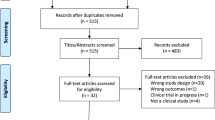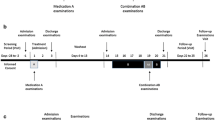Abstract
Purpose
Pharmacogenomics investigates interindividual genetic variability in the DNA sequence of drug targets, drug-metabolizing enzymes or disease genes, RNA expression, or protein translation of genes affecting drug response and drug safety. Aspirin and other nonsteroidal anti-inflammatory drugs (NSAIDs) are among the most commonly prescribed medications with well-documented variation in patient response in terms of efficacy and safety. This variation may in part be explained by pharmacogenomics.
Methods
In this paper I review data on the pharmacogenomics of aspirin and other NSAIDs focusing on clinical implications.
Results
Existing scientific evidence supports the pharmacogenomic basis of interindividual variation in treatment response to aspirin and NSAIDs, with clinical implications for antiplatelet action, cancer chemoprevention, and drug safety. However, further research efforts are needed before knowledge on the pharmacogenomics of aspirin and NSAIDs can be implemented in clinical practice.
Conclusion
The outcome of these research efforts would be anticipated to have added value for both science and society, contributing to the enhanced efficacy and safety of these agents through patient selection.
Similar content being viewed by others
References
Evans W (1999) Translating functional genomics into rational therapeutics. Science 286:487–491
Siva C, Yokoyama WM, McLeod HL (2002) Pharmacogenetics in rheumatology: the prospects and limitations of an emerging field. Rheumatology 41:1273–1279
Martínez C, Blanco G, Ladero JM, García-Martín E, Taxonera C, Gamito FG, Diaz-Rubio M, Agúndez JA (2004) Genetic predisposition to acute gastrointestinal bleeding after NSAIDs use. Br J Pharmacol 141:205–208
Würtz M, Kristensen SD, Hvas AM, Grove EL (2012) Pharmacogenetics of the antiplatelet effect of aspirin. Curr Pharm Des 18:5294–5308
Bierend A, Rau T, Maas R, Schwedhelm E, Böger RH (2008) P2Y12 polymorphisms and antiplatelet effects of aspirin in patients with coronary artery disease. Br J Clin Pharmacol 65:540–547
Goodman T, Ferro A, Sharma P (2008) Pharmacogenetics of aspirin resistance: a comprehensive systematic review. Br J Clin Pharmacol 66:222–223
Li Q, Chen BL, Ozdemir V, Ji W, Mao YM, Wang LC, Lei HP, Fan L, Zhang W, Liu J, Zhou HH (2007) Frequency of genetic polymorphisms of COX1, GPIIIa and P2Y1 in a Chinese population and association with attenuated response to aspirin. Pharmacogenomics 8:577–578
van Oijen MG, Huybers S, Peters WH, Drenth JP, Laheij RJ, Verheugt FW, Jansen JB (2005) Polymorphisms in genes encoding acetylsalicylic acid metabolizing enzymes are unrelated to upper gastrointestinal health in cardiovascular patients on acetylsalicylic acid. Br J Clin Pharmacol 60:623–628
Bigler J, Whitton J, Lampe JW, Fosdick L, Bostick RM, Potter JD (2001) CYP2C9 and UGT1A6 genotypes modulate the protective effect of aspirin on colon adenoma risk. Cancer Res 61:3566–3569
Chan AT, Tranah GJ, Giovannucci EL, Hunter DJ, Fuchs CS (2005) Genetic variants in the UGT1A6 enzyme, aspirin use, and the risk of colorectal adenoma. J Natl Cancer Inst 97:457–460
Hamman MA, Thompson GA, Hall SD (1997) Regioselective and stereoselective metabolism of ibuprofen by human cytochrome P450 2C. Biochem Pharmacol 54:33–41
Duggan DE, Hogans AF, Kwan KC, McMahon FG (1972) The metabolism of indomethacin in man. J Pharmacol Exp Ther 181:563–575
Zarza J (2003) Major bleeding during combined treatment with indomethacin and low doses of acenocoumarol in a homozygous patient for 2C9*3 variant of cytochrome P-450 CYP2C9. Thromb Haemost 90:161–162
Brenner SS, Herrlinger C, Dilger K, Mürdter TE, Hofmann U, Marx C, Klotz U (2003) Influence of age and cytochrome P450 2C9 genotype on the steady-state disposition of diclofenac and celecoxib. Clin Pharmacokinet 42:283–292
Kirchheiner J, Meineke I, Steinbach N, Meisel C, Roots I, Brockmoller J (2003) Pharmacokinetics of diclofenac and inhibition of cyclooxygenases 1 and 2: no relationship to the CYP2C9 genetic polymorphism in humans. Br J Clin Pharmacol 55:51–61
Yasar U, Eliasson E, Forslund-Bergengren C, Tybring G, Gadd M, Sjöqvist F, Dahl ML (2001) The role of CYP2C9 genotype in the metabolism of diclofenac in vivo and in vitro. Eur J Clin Pharmacol 57:729–735
Kirchheiner J, Tsahuridu M, Jabrane W, Roots I, Brockmoller J (2004) The CYP2C9 polymorphism: from enzyme kinetics to clinical dose recommendations. Personalized Med 1:63–84
Miners JO, Coulter S, Tukey RH, Veronese ME, Birkett DJ (1996) Cytochromes P450, 1A2, and 2C9 are responsible for the human hepatic O-demethylation of R- and S-naproxen. Biochem Pharmacol 51:1003–1008
Zhao J, Leemann T, Dayer P (1992) In vitro oxidation of oxicam NSAIDS by a human liver cytochrome P450. Life Sci 51:575–581
Hutzler JM, Kolwankar D, Hummel MA, Tracy TS (2002) Activation of CYP2C9-mediated metabolism by a series of dapsone analogs: kinetics and structural requirements. Drug Metab Dispos 30:1194–1200
Martínez C, Blanco G, García-Martín E, Agúndez JA (2006) Clinical pharmacogenomics for CYP2C8 and CYP2C9: general concepts and application to the use of NSAIDs. Farm Hosp 30:240–248
Kirchheiner J, Seeringer A (2007) Clinical implications of pharmacogenetics of P450 drug metabolising enzymes. Biochim Biophys Acta 1770:489–494
Tang W (2003) The metabolism of diclofenac—enzymology and toxicology perspectives. Curr Drug Metab 4:319–329
Kumar S, Samuel K, Subramanian R, Braun MP, Stearns RA, Chiu SH, Evans DC, Baillie TA (2002) Extrapolation of diclofenac clearance from in vitro microsomal metabolism data: role of acylglucuronidation and sequential oxidative metabolism of the acyl glucuronide. J Pharmacol Exp Ther 303:969–978
Martínez C, García-Martín E, Blanco G, Gamito FJ, Ladero JM, Agúndez JA (2005) The effect of the cytochrome P450 CYP2C8 polymorphism on the disposition of (R)-ibuprofen enantiomer in healthy subjects. Br J Clin Pharmacol 59:62–69
García-Martín E, Martínez C, Tabares B, Frías J, Agúndez JA (2004) Interindividual variability in ibuprofen pharmacokinetics is related to interaction of cytochrome P450 2C8 and 2C9 amino acid polymorphisms. Clin Pharmacol Ther 76:119–127
Pilotto A, Seripa D, Franceschi M, Scarcelli C, Colaizzo D, Grandone E, Niro V, Andriulli A, Leandro G, Di Mario F, Dallapiccola B (2007) Genetic susceptibility to nonsteroidal anti-inflammatory drug-related gastroduodenal bleeding: role of cytochrome P450 2C9 polymorphisms. Gastroenterology 133:465–471
Zarza Z (2003) Major bleeding during combined treatment with indomethacin and low doses of acenocoumarol in a homozygous patient for 2C9*3 variant of cytochrome P-450 CYP2C9. Thromb Hemost 90:161–162
Blanco G, Martinez C, Ladero JM, Garcia-Martin E, Taxonera C, Gamito FG, Diaz-Rubio M, Agundez JA (2008) Interaction of CYP2C8 and CYP2C9 genotypes modifies the risk for nonsteroidal anti-inflammatory drugs-related acute gastrointestinal bleeding. Pharmacogenet Genomics 18:37–43
de Abajo FJ, Montero D, Madurga M, Garcia Rodriguez LA (2004) Acute and clinically relevant drug-induced liver injury: a population based case–control study. Br J Clin Pharmacol 58:71–80
Aithal GP, Day CP, Leathart JB, Daly AK (2000) Relationship of polymorphism in CYP2C9 to genetic susceptibility to diclofenac-induced hepatitis. Pharmacogenetics 10:511–518
Daly AK, Aithal GP, Leathart JB, Swainsbury RA, Dang TS, Day CP (2007) Genetic susceptibility to diclofenac-induced hepatotoxicity: contribution of UGT2B7, CYP2C8, and ABCC2 genotypes. Gastroenterology 132:272–281
Chan AT, Zauber AG, Hsu M, Breazna A, Hunter DJ, Rosenstein RB, Eagle CJ, Hawk ET, Bertagnolli MM (2009) Cytochrome P450 2C9 variants influence response to celecoxib for prevention of colorectal adenoma. Gastroenterology 136:2127.e1–2136.e1
Samowitz WS, Wolff RK, Curtin K, Sweeney C, Ma KN, Andersen K, Levin TR, Slattery ML (2006) Interactions between CYP2C9 and UGT1A6 polymorphisms and nonsteroidal anti-inflammatory drugs in colorectal cancer prevention. Clin Gastroenterol Hepatol 4:894–901
McGreavey LE, Turner F, Smith G, Boylan K, Timothy Bishop D, Forman D, Roland Wolf C, Barrett JH, Colorectal Cancer Study Group (2005) No evidence that polymorphisms in CYP2C8, CYP2C9, UGT1A6, PPARdelta and PPARgamma act as modifiers of the protective effect of regular NSAID use on the risk of colorectal carcinoma. Pharmacogenet Genomics 15:713–721
Conflict of interest
None.
Sources of funding
None.
Author information
Authors and Affiliations
Corresponding author
Rights and permissions
About this article
Cite this article
Yiannakopoulou, E. Pharmacogenomics of acetylsalicylic acid and other nonsteroidal anti-inflammatory agents: clinical implications. Eur J Clin Pharmacol 69, 1369–1373 (2013). https://doi.org/10.1007/s00228-013-1477-9
Received:
Accepted:
Published:
Issue Date:
DOI: https://doi.org/10.1007/s00228-013-1477-9




